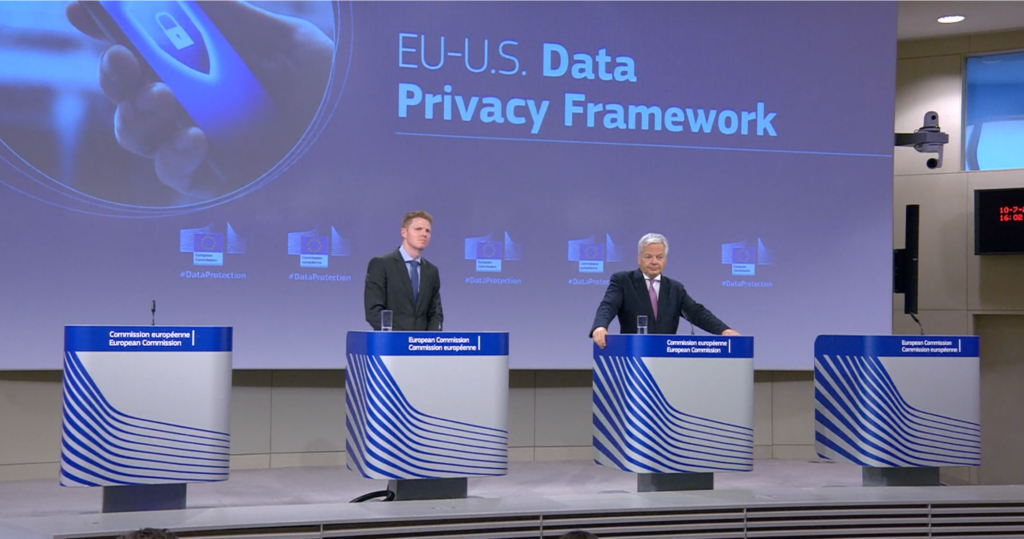This afternoon, the European Commission has adopted an adequacy decision for the EU-US Data Privacy Framework. This decision finds that the United States provides an equivalent level of data protection to that of the European Union, enabling the safe and unrestricted flow of personal data from the EU to U.S. companies under the new framework.
EU Companies using US vendors for their data
For companies operating within the EU, this adequacy decision eliminates the need for additional data protection measures when transferring personal data to U.S. vendors participating in the EU-U.S. Data Privacy Framework. It streamlines data transfers, allowing businesses to focus on their core operations without being burdened by complex compliance requirements.
If your company relies on U.S. vendors for services or data processing, this decision brings positive implications. The EU-US Data Privacy Framework introduces comprehensive binding safeguards to address concerns raised by the European Court of Justice. These safeguards ensure that access to EU data by U.S. intelligence services is limited to what is necessary and proportionate for national security purposes.
Moreover, the framework establishes a redress mechanism for EU individuals whose data is mishandled by U.S. companies. This includes independent dispute resolution mechanisms and an arbitration panel, providing added assurance to EU consumers and reinforcing trust in transatlantic data flows.
Serving EU Customers from the US
For U.S. vendors seeking to serve EU customers, participation in the EU-US Data Privacy Framework is crucial. By committing to comply with a detailed set of privacy obligations, U.S. companies can demonstrate their adherence to the high data protection standards required by the EU. This includes obligations such as purpose limitation, data minimization, data retention, data security, and responsible data sharing with third parties.
The framework will be administered by the U.S. Department of Commerce, ensuring proper oversight and monitoring of participating companies’ compliance. The U.S. Federal Trade Commission will enforce these obligations, safeguarding the interests of EU individuals and promoting accountability among U.S. vendors.
It is important to note that the safeguards implemented by the U.S. government to protect data privacy will also benefit companies using other data transfer mechanisms, such as standard contractual clauses and binding corporate rules. This provides flexibility and reassurance for companies engaged in transatlantic data transfers, regardless of the specific mechanism they choose.

We encourage companies to familiarize themselves with the details of the adequacy decision and the obligations set forth in the EU-US Data Privacy Framework as this will affect many data setups.
Criticism of the EU-US Data Privacy Framework
Critics argue that the new Trans-Atlantic Data Privacy Framework closely resembles its predecessors, particularly the failed “Privacy Shield” agreement. The fundamental concerns regarding U.S. surveillance laws and the unequal treatment of non-U.S. persons in terms of constitutional rights remain largely unaddressed. The framework’s reliance on the U.S. Executive Order 14086, which includes the term “proportionate” but interprets it differently than the European Court of Justice (CJEU), has raised concerns about the adequacy of protections.
Furthermore, the redress mechanism established under the new framework has been questioned. While some improvements have been made compared to the previous “Ombudsperson” mechanism, the individual’s direct interaction with the newly formed Civil Liberties Protection Officer (CLPO) and the “Court” is limited. Critics argue that this mechanism does not provide true judicial redress, as the response is already known before a case is brought, potentially undermining the effectiveness of individuals’ rights to seek redress.
It is expected that the privacy advocacy group noyb (None of Your Business) will challenge the adequacy decision in court. They contend that the new framework lacks substantial changes and does not address the necessary reforms to U.S. surveillance laws. Previous attempts, such as the “Safe Harbor” and “Privacy Shield,” have been declared invalid by the CJEU.
The potential legal challenge could result in further scrutiny of the Trans-Atlantic Data Privacy Framework. If the case reaches the CJEU, the court may suspend the framework during the review process, leading to a final decision in 2024 or 2025. This uncertainty raises concerns about the legal validity of data transfers conducted under the new framework.
